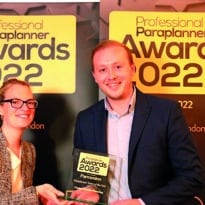Kimberley Tyson senior paraplanner at Telford Mann in Kettering recently received an award for her exam achievements, reflecting a career progression that started when she joined the firm five years ago.
Receiving the Simon Wheatley Shield from her local CII branch for her exam achievements, came out of the blue for 27-year-old Kimberley Tyson, senior paraplanner at Telford Mann Pensions & Investments in Kettering. But according to her boss and joint MD at the firm, Jilly Mann, it was well deserved, reflecting her ‘tireless’ approach to achieving qualifications at the highest level – she is now a Chartered Financial Planner and a Fellow of the Personal Finance Society.
It also reflects the importance attributed by the firm of Chartered Financial Planners and Discretionary Investment Managers to paraplanning, having increased the number of paraplanners in the past year to nine, supporting seven financial advisers. Five paraplanners have been recruited in the past year.
The firm encourages its staff to develop and improve, gaining qualifications being a part of that process. “The company invests in us; it provides a study plan, which sets out the exams it thinks we should take and rough targets by which we could achieve them. It also funds all our studies and provides encouragement and support as well as study leave approaching the exams,” Kimberley says.
She joined the company straight from Birmingham University where she studied sports science. It may not seem like it but there are a lot of similarities between sports science and paraplanning, she says. “In simple terms, it’s biology applied to sport. My dissertation was on the effect of exercise on anti-bodies. We collected and analysed the data and then wrote up a report; which is not too dissimilar to compiling a financial plan and suitability report for a client.”
She found the role at Telford Mann (at the time known as Moore Stephens Financial Services) through a recruitment agency and started by typing up meeting notes for the financial advisers.
This, she says, gave her useful insight into the company and what it did, and also was good preparation for the paraplanning role, seeing client circumstances and objectives and the information required when onboarding a new client and undertaking a review for an existing one.
Within nine months of joining the firm she was moved into a paraplanning role. She began by producing the review packs for existing clients, and some of the easier suitability reports, before being given more complicated packs to complete as her knowledge and experience grew. “It was a much nicer way of learning than being thrown in the deep end, and I had support around me to help guide me through it, including the other paraplanners and Jilly (Mann) also checked my work.”
Current role
Pensions work tends to dominate Kimberley’s current workload – transfers and drawdown requests, plus at this time of year, calculating end-of-tax year pensions contributions – followed by work on investment and also protection. “We see protection as an important part of financial planning. We’ve had clients that we’ve arranged life cover for who have left partners behind and it has been a huge weight off their shoulders to know the mortgage can be paid off, for example, helping secure their partner’s future.”
She receives support from the paraplanning team around her, who will discuss issues as they arise “and the financial advisers all help too. We can bounce things off them.”
There are four ‘long time’ paraplanners in the firm and five who have joined in the last year, who are learning the ropes. Part of Kimberley’s role is to support the latter through their training.
The training process follows a similar path to the one she herself took when joining the firm. As an example, she says, “when I am putting together a review pack for a client, I’ll talk it through with one of the trainees so they can see what I’m doing and why, and then I’ll select a pack for them to do themselves. It’s then a process of checking what they have done, giving them more to do and checking, giving feedback and developing their experience and skills from there. It’s an ongoing cycle.”
Kimberley also chairs the monthly paraplanner meeting, where the team will discuss any issues or technical items that have arisen during the month. “We have a wallboard and we post anything we want to raise in the meeting on that so we can prepare in advance.
“We’re changing our processes all the time as we look to develop and become more efficient. A big development for us has been a change of platform, which started around 18 months ago, and even now we’re discovering small quirks that only come to light as you start using the system. Those are the types of issues that will be raised in the meetings, so everyone is aware.”
Telford Mann has £550m under management and over 2,500 clients. Accordingly, for efficiency, the paraplanning team makes use of templates where it can, “but we keep the client’s objectives and recommendations freestyle so that we can make the reports as personal as possible.”
Changing perceptions
Kimberley says she has no desire to be a financial adviser at present. “When I left University, I knew I wanted to have a career where I could develop and grow my knowledge and skills. I can see myself being happy as a paraplanner for many years ahead.”
She also believes more firms are recognising the importance of paraplanning to their businesses. “When people think of financial planning they tend to think of financial advisers and not many people realise paraplanning exists. I think often clients don’t know what is happening behind the scenes and how much of the work is done by the paraplanning teams in firms. But I see that is changing – paraplanners are being given more responsibilities and taking on more within firms.
“Also, I think a lot of people see financial advice as an area which only helps the retired or very wealthy. But we have a wide spread of clients including younger people. Some of the cases I’ve worked on which have been the most rewarding have been with younger people who need help growing their wealth and setting objectives for their futures. We’ve been able to educate them and help them to see what is possible. I think with the changes in pension saving it is going to be more and more important for people to get advice from an earlier age to help them set realistic objectives and plan what they need to do to get there.”
In terms of her career, having attained Chartered and Fellowship and after five years of following the qualifications route, what’s next? “I will probably take a gap from sitting exams for a while,” she says. “But then I’ll look round and see what I can do next and which qualifications the company feels will be beneficial for me to do. I want to ensure I keep developing and growing as a paraplanner.”
Kimberley on how she structures her day
“I’m a morning person, so I like to get the important things done as soon as I can in the day, and I structure my day in that way.
The first thing I do is check my emails, as well as my advisers, to see what we may need to respond to urgently. Then I’ll check any previous day’s work from the trainees. I try to do this at the start of each day so they get the feedback to work on as soon as possible. After that I’ll write any suitability reports or review packs that I need to get done.
This usually takes me up to lunchtime. In the afternoon, I’ll make any necessary calls to providers, where, for example, I may need information for letters of authority and so on.
At the end of the day, I’ll sit down and write a ‘To Do’ list for the following day. It’s rare to get all your list done in a day, but I think it’s important to go into the next day knowing what needs to be done.
I definitely feel it helps to have this kind of structure to a working day, knowing what you are going to be doing and when; it also allows you to tackle a variety of tasks.”





























